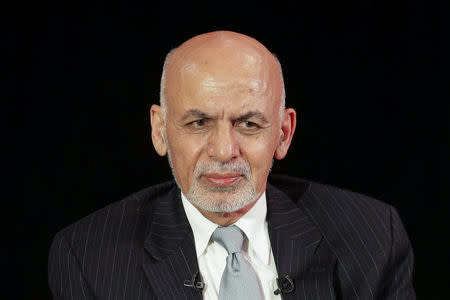Afghan president says Trump war plan has better chance than Obama's
By Jonathan Landay (Reuters) - Afghan President Ashraf Ghani said on Wednesday that U.S. President Donald Trump's strategy to win the war in Afghanistan will work where his predecessor's failed because the Afghan army is stronger and Trump wants a regional approach and a harder line with Pakistan. Ghani also said that former President Barack Obama "did not have a partner in Afghanistan," implicitly criticizing former Afghan President Hamid Karzai, who frequently disdained U.S. policy and the U.S.-led international military force. "President Trump is not just an individual (but) a team of partners in Afghanistan," Ghani told the Asia Society in New York, where he is attending the U.N. General Assembly. "The Trump administration's strategy has the uniqueness of immense consultations with us." At the same time, Ghani said, Obama's decision to maintain some U.S. forces in Afghanistan "ensured our survival" despite advances by Taliban insurgents. U.S. Defense Secretary Jim Mattis said on Monday that more than 3,000 additional U.S. troops are being deployed to Afghanistan under the new strategy announced last month. The number of U.S. forces would rise to more than 14,000, compared to a high of more than 100,000 under Obama. While providing few details, Trump pledged stepped-up operations against the Taliban and an open-ended commitment of U.S. military advisers, trainers and counter-terrorism units. He also vowed to take a tougher line to end what U.S. officials say is Pakistan providing refuge and other support to the Taliban and other extremist groups. Pakistan denies the charge. Asked how Trump's strategy differs from Obama's, Ghani said Trump's plan takes "a regional approach" to security and a harder line with Pakistan while providing a new opening for peace talks. "The message to Pakistan to engage and become a responsible stakeholder in the region and in the fight against terrorism has never been clearer," Ghani said. "What I am offering the Pakistan government, the Pakistan security apparatus, is the invitation to a comprehensive dialogue." "If Pakistan does not take this opportunity, I think they will pay a high price," he said, without elaborating. "Afghans are determined to fight," he said. "No one should mistake our will to defend our country." Not only is the army better trained and profiting from a new generation of soldiers, but it gained experience because the massive cuts in the U.S.-led international force under Obama forced Afghans to assume a bigger role in the fighting, Ghani said. When it was pointed out that the Taliban have expanded their control of territory, Ghani blamed the inability of the police to hold ground. The next phase of reforming Afghanistan's security forces will focus on the police, he said. As for when the 16-year-long war would end, Ghani said, "I think we are not talking a decade or longer. We are talking some limited years." (Corrects to Mattis said on Monday instead of Tuesday and corrects number of troops to more than 14,000 instead of around 12,000, paragraph 5) (Reporting by Jonathan Landay; Editing by John Walcott and Grant McCool)

 Yahoo News
Yahoo News 

